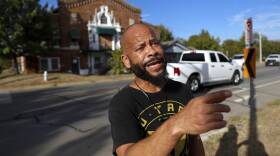EXPLORE MORE
Monday on BPR, live from Brighton:
Brown University gun violence scholar Ieva Jusionyte
Princeton University's Khalil Gibran Muhammad
Food policy analyst Corby Kummer
Comedian Jimmy Tingle
Co-founders of Boston HEAT (Human Exploitation Advocacy Team)
Recent segments
-
New Book Looks At Rise And Fall Of Uber CEO: 'I've Never Seen Anyone Hate Another Company As Much As He Did'
In "Super Pumped," New York Times reporter Mike Isaac explores the rise and fall of former Uber CEO Travis Kalanick -
New FRONTLINE Film Focuses On The 3 Men Behind Trump's Immigration Policy
A new FRONTLINE film explores the background of President Trump's immigration policy. -
All Rev'd Up: White Nationalists Are 'Part Of Our Police Force'
The reverends discuss the danger that black people feel and face from the police force. -
Charlie Sennott: Turkish Attacks Against Kurds May Amount To Ethnic Cleansing
WGBH News Analyst Charlie Sennott said that President Trump’s pulling out from Syria is both a strategic and moral failure. -
Bob Thompson: What To Watch This Week In TV
"Modern Love" is TV expert Bob Thompson's best show this week. -
BPR News Quiz: The Winter Pack
WGBH News Reporter Edgar B. Herwick III and Pledgemaster Andy Hicks peddled some WGBH wares during pledge.
Listen to previous shows
-

BPR Full Show: A Spring in Our Steps
Today on Boston Public Radio: We begin the show by asking listeners how they’re responding to vaccine hesitancy. Sue O’Connell shares her thoughts on the Vatican’s decree on same-sex marriage, and Jared Kushner’s book plans. O’Connell is the co-publisher of Bay Windows and the South End News, as well as NECN's political commentator and explainer-in-chief. Emily Rooney talks about the resignation of incoming Teen Vogue editor in chief Alexi McCammond after anti-Asian tweets she wrote as a teenager resurfaced. She also previews this week’s Beat the Press. Rooney is host of Beat the Press, which you can watch Friday nights at 7 p.m. Corby Kummer updates us on the latest headlines at the intersection of food policy and food culture, from Boston restaurants reopening for outdoor dining to Massachusetts restaurant workers becoming eligible for vaccination. Kummer is the executive director of the Food and Society policy program at the Aspen Institute, a senior editor at The Atlantic and a senior lecturer at the Tufts Friedman School of Nutrition Science and Policy. Dr. Michelle Morse discusses her research into how COVID-19 has exacerbated racial inequality, explaining how reparations for slavery would have mitigated COVID-19 transmissions and fatalities in Black American communities. Dr. Morse is the Deputy Commissioner for the Center for Health Equity and Community Wellness and Chief Medical Officer at the NYC Department of Health and Mental Hygiene. Dr. Morse previously worked at Harvard Medical School. We wrap up the show by talking with listeners about the surge in plant sales during the pandemic. -

Corby Kummer: Should Outdoor Dining Be A Permanent Fixture In Boston?
Boston’s outdoor dining program, which launched last spring to help restaurants survive amid the coronavirus pandemic, will soon be back in action. Starting on March 22nd, most restaurants in the city will be able to offer outdoor dining to patrons until Dec. 1st. Food writer Corby Kummer spoke with Boston Public Radio on Friday about whether outdoor dining should become a permanent fixture in the city. Other cities have programs in place that allow restaurants to expand into communal outdoor dining blocks, Kummer noted. “Washington D.C. has the ‘Streatery’ program and New York City has ‘Open Streets: Restaurants,’ so I think it’s great, and that this is like Europe and the way life is supposed to be with dining outdoors,” he said. Kummer hopes that restaurateurs and staff enjoy the outdoor dining option too. “I hope it’s worth it to them to have the operations, and to have bought the equipment and street furniture to make these outdoor set-ups,” he said. “I think it has made life just significantly better, and with any luck, it adds seats, so it would be a permanent revenue adding generation mechanism.” Kummer is a senior editor at The Atlantic, an award-winning food writer, and a senior lecturer at the Tufts Friedman School of Nutrition and Policy. -

BPR Full Show: No Excuses
Today on Boston Public Radio: Chuck Todd updates us on the latest political headlines, from debates over repealing the filibuster to the link between former President Donald Trump’s comments on COVID-19 and violence against Asian Americans. Todd is the moderator of “Meet the Press” on NBC, host of “Meet the Press Daily" on MSNBC, and the Political Director for NBC News. Next, we open the phone lines to talk with listeners about the rise of violence against Asian Americans. Andrea Cabral shares her thoughts on New York District Attorney Cy Vance’s investigation into former President Trump’s taxes, and weighs in on Massachusetts’ compassionate release law. Cabral is the former Suffolk County sheriff and Massachusetts secretary of public safety. She’s currently the CEO of the cannabis company Ascend. We ask listeners what they’ll use as an excuse to get out of obligations once the pandemic ends. Andy Ihnatko explains the environmental impact of bitcoin and streaming services. He also discusses craft printing company Cricut’s decision to back off of a retroactive subscription fee for device owners. Ihnatko is a tech writer and blogger, posting at Ihnatko.com. Shirley Leung discusses the rise in violence against Asian Americans, and shared her thoughts on the spa and massage parlor killings in Georgia. She also talks about Gov. Charlie Baker’s declining approval rates. Leung is a business columnist for the Boston Globe. -

BPR Full Show: Let Me Reintroduce Myself
Today on Boston Public Radio: Jonathan Gruber explains how the passage of President Joe Biden’s $1.9 trillion stimulus package could lower the cost of the Affordable Care Act. Gruber is the Ford Professor of Economics at MIT. He was instrumental in creating both the Massachusetts health-care reform and the Affordable Care Act, and his latest book is "Jump-Starting America How Breakthrough Science Can Revive Economic Growth and the American Dream." Next, we ask listeners what their thoughts were on Gov. Charlie Baker’s vaccine eligibility timeline. Juliette Kayyem discusses Tuesday’s spa and massage parlor killings in Atlanta, updating us on what Georgia officials are learning as they investigate the case. She also talks about a recently declassified report stating that the Russian government interfered with the 2020 U.S. election. Kayyem is an analyst for CNN, former assistant secretary at the Department of Homeland Security and faculty chair of the homeland security program at Harvard University’s Kennedy School of Government. Art Caplan weighs in on Europe’s suspension of the AstraZeneca vaccine, and whether it’s safe to send kids back to school with new COVID-19 variants on the rise. Caplan is the Drs. William F and Virginia Connolly Mitty Chair, and director of the Division of Medical Ethics at the NYU School of Medicine. Bina Venkataraman talks about the resurrection of the abolitionist newspaper The Emancipator by The Boston Globe, Dr. Ibram X. Kendi and the Boston University Center for Antiracist Research. She also discusses her editorials on statewide police reform and Boston police overtime. Venkataraman is the editorial page editor at The Boston Globe. Her latest book is “The Optimist's Telescope: Thinking Ahead in a Reckless Age.” We end the show by talking with listeners about reentering society, post-pandemic. -

BPR Full Show: Asphalt Jungle
Today on Boston Public Radio: We start the show by asking listeners whether their relationship with Amazon would change if an Amazon warehouse moved into their neighborhood. Trenni Kusnierek weigh in on Sen. Mitt Romney’s New York Times op-ed calling for an economic and diplomatic boycott of the 2022 Beijing Winter Olympics. She also discusses Cam Newton’s deal with the Patriots, and the return of the Boston Marathon. Kusnierek is a reporter and anchor for NBC Sports Boston, and a weekly Boston Public Radio contributor. Lyndia Downie talks about the challenges of keeping the homeless community safe during the pandemic. She also explains how shelters across the country are converting old hotels and motels into supportive housing. Downie is president and executive director of the Pine Street Inn. Chris Dempsey and Jim Aloisi discuss service cuts to the MBTA, as more people receive vaccinations and return to work in-person. Dempsey is the Massachusetts Director of Transportation and former assistant secretary of transportation. Aloisi is the former Massachusetts transportation secretary, a member of the Transit Matters board, and contributor to Commonwealth Magazine. Rick Steves shares his thoughts on what travel may look like once more people get vaccinated. He also talks about the difference between how Ireland and the U.S. celebrate St. Patrick’s Day. Steves is an author, television and radio host and the owner of the Rick Steves' Europe tour group. You can catch his television show, "Rick Steves’ Europe," weeknights at 7:30 p.m. on GBH 2 and his radio show, “Travel With Rick Steves,” Sundays at 4 p.m. on GBH. John King updates us on the latest political headlines, from moves to repeal the filibuster to the 2022 midterm elections. King is CNN's Chief National Correspondent and anchor of "Inside Politics,” which airs weekdays and Sunday mornings at 8 a.m. We wrap up the show by talking with listeners about what TV shows got them through the pandemic.








